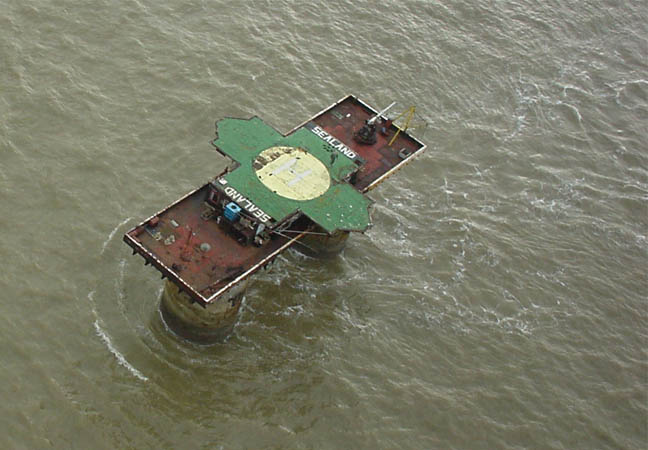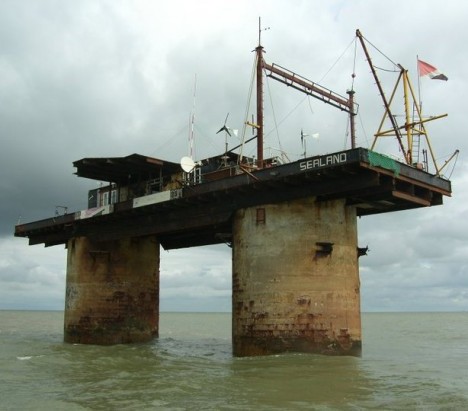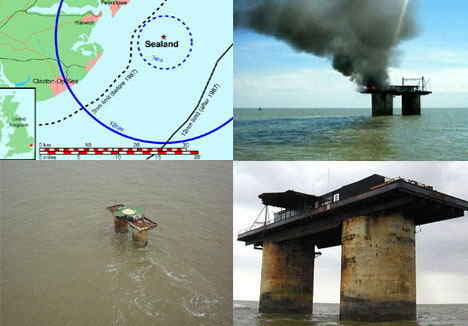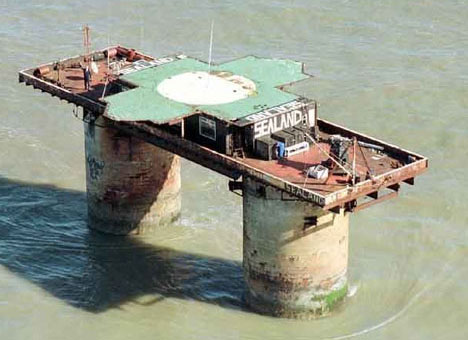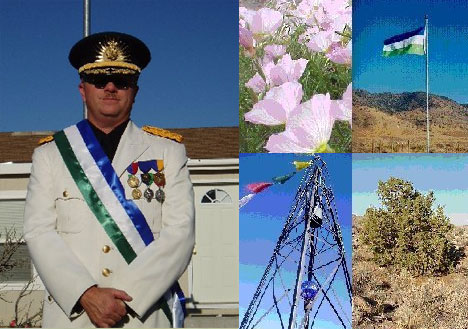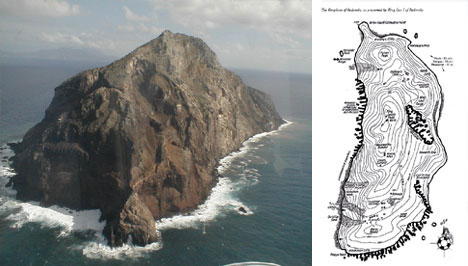Have you ever wanted to rule your very own country? Bizarre as it sounds, a micronation is an area of land claimed by one or more persons to be independent from any major recognized nation in the world. Some of these have incredible histories of war, triumph and independence and still survive today, while others have long since been abandoned, annexed or destroyed.
Above: Sealand inside and out after the fire of 2006
Sealand was established in the 1960s an Englishman and his family took possession of an abandoned anti-aircraft platform off the coast of Britain and declared it to be the Principality of Sealand. In the1970s a coup attempt was made and the island was taken over by one citizen of Sealand with outside assistance. Sealand was retaken with armed forces and its over-throwers were held for a time as prisoners of war until negotiations with foreign nations secured their release. More recently, Sealand caught fire though no one was seriously injured.
Above: A brief history of Sealand and information on its failed sale
Sealand has since been of international news interest in relationship to its controversial status as a data haven, and was pursued for purchase by ThePirateBay. The offer was reportedly entertained – problematically for the rulers of Sealand: as it turns out, one cannot actually sell a nation. Meanwhile, it may be the only one turned into a micronation, but Sealand is not alone in British coastal waters – indeed, its larger island cousin has a great many deserted, converted and reused sea forts.
Above: bizarre silent film: Molossia propaganda spoof
Above: a brief and humorous interview with the president of Molossia
Molossia was founded in the 1970s on a small stretch of land in rural Nevada. The population of four claims to be an independent nation-state though it is completely encompassed by the United States of America. In theory, the country has a constitution. In practice, there has been “political unrest” which has given rise to a state of martial law in which the president (Kevin Baugh) has full authority. In Molossia, incandescent light bulbs, cat fish and tobacco have all been outlawed. Molossia was even host to the first ever intromicronational olympics.
Redonda was first claimed by Christopher Columbus in 1493, though many have claimed to be the king of this strange uninhabited rock ever since. With steep cliffs and just one square mile of land, Redonda is essentially empty save for some feral goats. Redonda’s biggest natural resource has historically been bird excrement, which was mined at a rate of 7,000 tons per year around the turn of the 20th Century. More recently, a pub in England claimed to be an embassy from Redonda in an attempt to be exempted from the English smoking ban on workspace. They were denied such status.
Other micronations have not fared so well. The Republic of Rose Island, for instance, was a short-lived pursuit that was demolished by the Italian navy for not paying taxes. Another would-be micronation founder, Leicester Hemingway (brother of author Ernest Hemmingway) attempted to found his own such settlement known as New Atlantis only to be pillaged by Mexican fishermen. The island Republic of Minerva also did not last long, being quickly invaded and annexed by the neighboring Tonga. The bizarre Empire of Atlanteum, located in Sydney, Australia and founded with some interesting and bizarre ideals, still survives, though its international political and legal status is questionable. For more on the weird micronations of the world and how to visit them, you can check out the Lonely Planet awesome travel guide to the world’s micronations.
